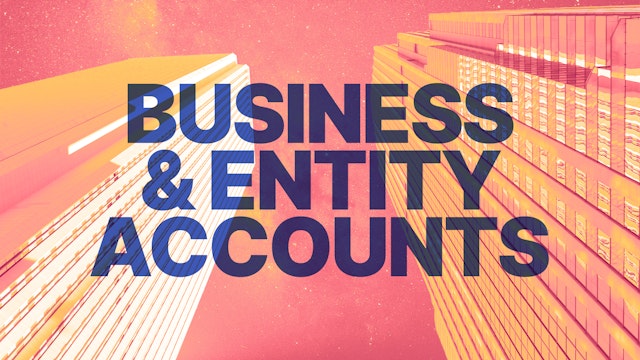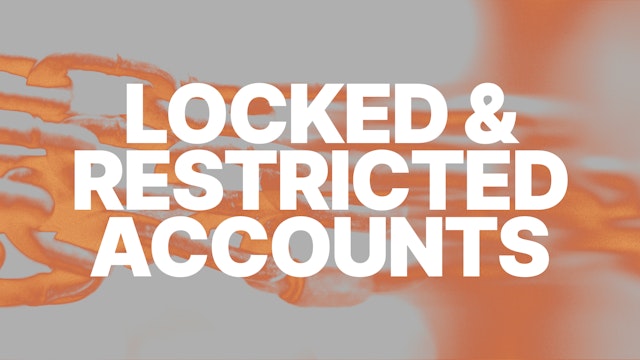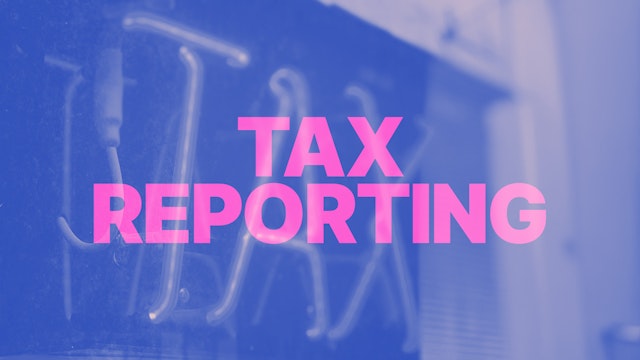Crypto Traders and Businesses: This is Tax Stuff to Keep in Mind
Are you a crypto trader? Or do you have a crypto business? There is an important tax distinction between these two things.
In this article...
- Crypto tax is something all investors need to keep in mind
- Are you a crypto crypto trader? Or do you have a crypto business?
- The distinction between the two has tax implications.

Are you a crypto trader or a crypto business? Then there are a few considerations to keep in mind. Especially if you don’t want the tax man coming over to your house and asking for a cup of tea and a chat.
While most individuals engaging with cryptocurrency are classified as investors by HMRC, different rules apply to crypto-focused businesses like mining operations, and to those operating as traders.
Determining trader status
Identifying as a trader isn't solely based on trade volume. HMRC requires evidence of operating in a business-like manner.
Key indicators include:
-Substantial capital investment
-Focus on short-term profits, not long-term holdings
-Frequent, high-volume trading activity
-Use of derivative instruments
-Active trading strategies with risk management
-Formal business operations (e.g., registration, business plan, dedicated workspace, detailed record-keeping).
If these criteria largely apply, you may be considered a trader. If unsure, seeking advice from a crypto tax specialist is recommended.
Tax implications for traders/crypto businesses
Crypto traders are taxed similarly to other crypto businesses. This can involve income tax, and potentially Corporation Tax, Stamp Duty, VAT, and National Insurance contributions. Due to the complexities, consulting a crypto tax expert is a seriously good idea.
Trader vs. investor: Can you be both?
Yes, you can be both. However, maintain separate wallets to minimise transaction overlap between trading and investment activities. You can also be a crypto trader and a stock market investor, or vice versa.
Understanding cryptocurrency trader taxation
A crypto trader is generally treated as a sole trader for tax purposes. Profits are considered trading income, and expenses are tax-deductible.
Year-end calculations involve tallying income, expenses, and portfolio value changes. Profits are subject to relevant business taxes and added to overall taxable income. Losses may be deductible from other income.
Benefits of trader status
Here’s what you need to know:
-Small business tax incentives may apply.
-Eligible expenses (hardware, software, fees) can be deducted.
-Potential for asset write-offs.
Drawbacks of trader status
-Self-employed traders pay National Insurance on profits, in addition to Income Tax.
-High income can lead to a significant tax burden.
-Increased scrutiny from HMRC is possible.
-More complex record-keeping and compliance are required.
-Staying updated on evolving crypto tax regulations is essential.
Sole Trader Status and VAT
If classified as a crypto trader and earning over £1,000 annually, you'll need to register as a sole trader. VAT treatment of crypto is specific. These rules are subject to change, so keeping an eye on the HMRC website is a good idea.
If you receive crypto in exchange for goods or services, VAT will be due as normal. For other types of crypto transactions, for example buying/selling cryptoassets, VAT is generally not applied.
Taxation of crypto mining
Income from crypto mining is taxable. If mining is conducted as a business (formal setup, business plan, etc.), mined crypto is income (valued in GBP at the time of mining) and added to trading stock.
Sales, trades, and staking income are also taxable, and National Insurance contributions are required. Business expenses like hardware depreciation and electricity costs are deductible.
Taxing loans, staking, and other crypto business income
Any crypto income or expenses within a business context must be reported in GBP. The tax treatment of specific activities (e.g., loans, staking) may vary, so individual assessment is necessary.
Paying employees in cryptocurrency
Paying employees in crypto is treated like regular wages. PAYE obligations apply based on the GBP value of the crypto on the payment date. Similarly, receiving a salary in crypto is considered PAYE income, with its GBP value on the receipt date added to taxable income. Subsequent sales or trades are treated as capital gains events.
Reporting your tax
The UK tax year is from April 6 to April 5. Include all crypto transactions within this period on your tax return. Deadlines vary for paper and online returns. Meeting deadlines is crucial to avoid penalties.
Essential records to keep
Maintain detailed records of all crypto transactions, including:
-Transaction dates -GBP value at the time of the transaction -Transaction purpose -Counterparty details (e.g., wallet address)
Also, keep evidence of:
-Purchase/transfer receipts
-Asset totals
-Exchange records
-Agent / accountant / legal invoices
-Wallet records/keys
-Tax management software costs
Managing transaction records
For frequent traders, record-keeping can be challenging. CoinJar offers tax statements to help:
-Log in to your account
-Go to Settings > General > Reports > Export
-Export account statements, purchase/sale records, and deposit/withdrawal records for specific date ranges.
Tax for Crypto Traders and Businesses
Maintaining records of all transactions and seeking advice from a crypto tax specialist can significantly ease the burden of compliance. Tools like CoinJar’s tax statements can also streamline the process for frequent traders.

Suggested Articles

How to Set Up a CoinJar Account for Your Company in the United Kingdom
You can set up a CoinJar account for your company or business entity. Here are the steps you can follow to achieve this.Read more
Your CoinJar Account is Restricted: Why It Happens and How to Fix It
Resolution steps: A clear guide on how to verify your identity and contact support to regain access.Read more
Exporting Your Trading and Transaction History for Tax Purposes
A step-by-step guide for CoinJar customers: How to export your trading and transaction history for the tax year.Read moreBrowse by topic
Standard Risk Warning: The above article is not to be read as investment, legal or tax advice and it takes no account of particular personal or market circumstances; all readers should seek independent investment advice before investing in cryptocurrencies.
The article is provided for general information and educational purposes only, no responsibility or liability is accepted for any errors of fact or omission expressed therein. Past performance is not a reliable indicator of future results. We use third party banking, safekeeping and payment providers, and the failure of any of these providers could also lead to a loss of your assets.
We recommend you obtain financial advice before making a decision to use your credit card to purchase cryptoassets or to invest in cryptoassets.
Capital Gains Tax may be payable on profits.
CoinJar's digital currency exchange services are operated in the UK by CoinJar UK Limited (company number 8905988), registered by the Financial Conduct Authority as a Cryptoasset Exchange Provider and Custodian Wallet Provider in the United Kingdom under the Money Laundering, Terrorist Financing and Transfer of Funds (Information on the Payer) Regulations 2017, as amended (Firm Reference No. 928767).
In the UK, it's legal to buy, hold, and trade crypto, however cryptocurrency is not regulated in the UK. It's vital to understand that once your money is in the crypto ecosystem, there are no rules to protect it, unlike with regular investments.
You should not expect to be protected if something goes wrong. So, if you make any crypto-related investments, you're unlikely to have recourse to the Financial Services Compensation Scheme (FSCS) or the Financial Ombudsman Service (FOS) if something goes wrong.
The performance of most cryptocurrency can be highly volatile, with their value dropping as quickly as it can rise. Past performance is not an indication of future results.
Remember: Don't invest unless you're prepared to lose all the money you invest. This is a high-risk investment and you should not expect to be protected if something goes wrong. Take 2 mins to learn more.
UK residents are required to complete an assessment to show they understand the risks associated with what crypto/investment they are about to buy, in accordance with local legislation. Additionally, they must wait for a 24-hour "cooling off" period, before their account is active, due to local regulations. If you use a credit card to buy cryptocurrency, you would be putting borrowed money at a risk of loss.
We recommend you obtain financial advice before making a decision to use your credit card to purchase cryptoassets or to invest in cryptoassets.
Specific risks associated with stablecoins: There is a risk that any particular stablecoin may not hold their value as against any fiat currency; or may not hold their value as against any other asset. Stablecoins carry the following risks:
Depegging events: Depegging events may occur with stablecoins that fail to maintain adequate controls and risk mitigants. A depegging event is when the value of the stablecoin no longer matches the value of the underlying asset. This could result in a loss of some or all of your investment.
• Counterparty risk: Counterparty risk arises when an asset is backed by collateral, involving a third party maintaining the collateral, which introduces risk if the party becomes insolvent or fails to maintain it.
• Redemption risk: Redemption risk refers to the possibility that an asset's ability to be redeemed for underlying collateral may not be as anticipated during market fluctuations or operational issues.
• Collateral risk: Collateral risk refers to the possibility of the collateral's value declining or becoming volatile, potentially impacting the asset's stability, particularly when it is another crypto-asset.
• Exchange rate fluctuations: Stablecoins, often denominated in US Dollars, expose investors to fluctuations in the USD:GBP exchange rate.
• Algorithmic risk: Algorithm risk refers to the possibility of an asset's stability being compromised due to unexpected failure or behaviour of the underlying algorithm, potentially leading to loss of value.
Specific risks associated with meme coins: 'Meme coins' (e.g. DOGE, SHIB, PEPE) are crypto-assets whose value is driven primarily by community interest and online trends. Meme coins carry the following risks:
• Volatility risk: Meme coins can have extreme price volatility, often experiencing rapid and unpredictable price fluctuations within short periods. The value of meme coins can be influenced by social media trends, celebrity endorsements, and other factors unrelated to traditional investment fundamentals.
• Lack of utility: Meme coins often lack intrinsic value or utility, being primarily driven by community interest, online trends, and speculative trading.
• Market manipulation: Meme coins may be susceptible to increased risk of market manipulation including 'pump-and-dump' schemes, where the price is artificially inflated followed by a sudden crash.
• Lack of transparency: Meme coins may have limited available information about their development teams, goals, and financials. This lack of transparency can make it challenging to assess the credibility and potential of a meme coin accurately.
• Emotional investing: Meme coins often garner strong emotional reactions from investors, leading to impulsive decisions. Emotional trading activity can amplify losses. Specific risks associated with DeFi tokens
Decentralised Finance (or 'DeFi') tokens (e.g. UNI, AAVE) are crypto-assets linked to financial applications and protocols built on decentralised blockchain technology.
DeFi tokens carry the following risks:Smart contract risk: DeFi relies heavily on smart contracts. Even a minor coding error or oversight can lead to a contract being exploited, potentially resulting in significant losses for DeFi tokens.
Regulatory risk: DeFi operates in a decentralised manner, often without intermediaries or financial crime controls. Regulatory bodies across jurisdictions might introduce new regulations impacting the use, value, or legality of certain DeFi protocols or assets. Rug-pulls / Exit scams: Some DeFi projects might be launched by anonymous or pseudonymous teams, increasing the risk of "rug pulls" where developers abandon the project and withdraw funds, leaving investors with worthless tokens.
Data/oracle risk: DeFi protocols often rely on external data sources or 'oracles. Manipulation or inaccuracies in these data sources can lead to unintended financial outcomes within the protocols.
Protocol complexity: The complexity of some DeFi protocols can make it difficult for average users to fully understand the mechanisms and associated risks.
If you use a credit card to buy cryptocurrency, you would be putting borrowed money at a risk of loss. We recommend you obtain financial advice before making a decision to use your credit card to purchase cryptoassets or to invest in cryptoassets.
Your information is handled in accordance with CoinJar’s Privacy Policy.
Cryptoassets traded on CoinJar UK Limited are largely unregulated in the UK, and you are unable to access the Financial Service Compensation Scheme or the Financial Ombudsman Service.
We use third party banking, safekeeping and payment providers, and the failure of any of these providers could also lead to a loss of your assets.
We recommend you obtain financial advice before making a decision to use your credit card to purchase cryptoassets or to invest in cryptoassets. Capital Gains Tax may be payable on profits.
CoinJar’s digital currency exchange services are operated in the UK by CoinJar UK Limited (company number 8905988), registered by the Financial Conduct Authority as a Cryptoasset Exchange Provider and Custodian Wallet Provider in the United Kingdom under the Money Laundering, Terrorist Financing and Transfer of Funds (Information on the Payer) Regulations 2017, as amended (Firm Reference No. 928767).
Apple Pay and Apple Watch are trademarks of Apple Inc. Google Pay is a trademark of Google LLC.
This site is protected by reCAPTCHA and the Google Privacy Policy and Terms of Service apply.

